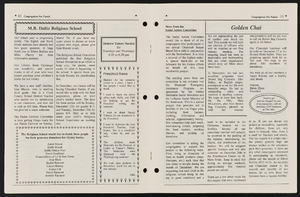Search the Special Collections and Archives Portal
Search Results
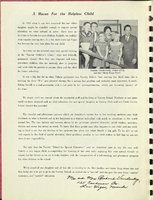
Program for Gay 90s Revue by Variety Club Number 39, November 1960
Date
Archival Collection
Description
This program has fundraising advertisements from community members, celebrities and performers in Las Vegas who supported the event that benefited the Variety Club.
Text
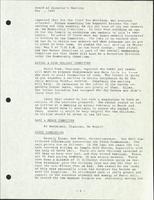
Minutes from Temple Beth Sholom Board of Directors meetings, June 1987 - May 1988 (1 of 2)
Date
Archival Collection
Description
Minutes from Temple Beth Sholom Board of Directors meetings, June 1987 - May 1988 (1 of 2)
Text
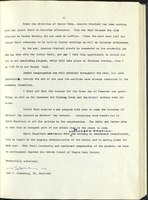
Minutes from Temple Beth Sholom Board of Directors meetings, May 1974 - May 1975
Date
Archival Collection
Description
The meeting minutes of the board of directors of Temple Beth Sholom include the proceedings of meetings held from 1973 to 1974.
Text
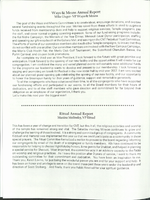
Annual report from Congregation Ner Tamid, 2006
Date
Archival Collection
Description
Annual report from Congregation Ner Tamid, 2006
Text

Mabel Hoggard: scrapbook
Date
Archival Collection
Description
From the Mabel Hoggard Papers (MS-00565) -- Personal papers file. This scrapbook contains mainly newspaper clippings and greeting cards to Mabel Hoggard from friends and family.
Mixed Content
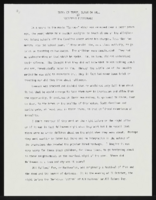
"Trick or Treat, Slave or Free": article draft by Roosevelt Fitzgerald
Date
Archival Collection
Description
From the Roosevelt Fitzgerald Professional Papers (MS-01082) -- Drafts for the Las Vegas Sentinel Voice file. On Halloween and Nevada Day.
Text
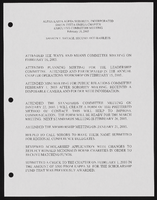
Alpha Kappa Alpha Sorority, Theta Theta Omega Chapter executive committee reports
Date
Archival Collection
Description
From the Alpha Kappa Alpha Sorority, Incorporated, Theta Theta Omega Chapter Records (MS-01014) -- Chapter records file.
Text

Transcript of interview with Greg Goussak by Barbara Tabach, May 19, 2015
Date
Archival Collection
Description
Interview with Greg Goussak by Barbara Tabach on May 19, 2015. In this interview Goussak discusses his upbringing in Las Vegas, including his education in the Clark County School District and his experience with bussing to Sixth Grade Centers as the school district attempted to desegregate. As a teenager, he became involved with the B'nai B'rith Youth Organization through Temple Beth Sholom. Goussak talks about his mother's involvement with the Albert Einstein Hebrew Day School, which later moved and became the Dr. Miriam and Sheldon Adelson Educational Campus, and the kidnapping of Cary Sayegh. He then discusses finding his niche in accounting through taking an accounting course at UNLV as a high school student. Goussak talks about his education, career path as a controller in the gaming industry and public works projects, and becoming a professor.
Greg Goussak is a Las Vegas native, born January 1961, just after his parents moved to the city for his father's work as an accountant. His mother was a dedicated educator, who served throughout the city as a teacher and principal, including as the director of the Hebrew Day School in the 1970s. Greg's childhood was shaped by experiences with Las Vegas' sixth grade centers, challenges with scoliosis, and especially, involvement with B'nai B'rith Youth Organization (BBYO). In 1974, Greg helped start the city's new Aleph Zadik Aleph (AZA) chapter for BBYO, and his involvement with this youth organization became a formative part of his junior high and high school years. During this time, he became very involved with AZA at the regional, district and national levels, and made lifelong friends. As a high school student, Greg participated in UNLV's Early Studies Program, earning him college credit, and there he discovered his aptitude for accounting. He began tutoring fellow high school students in accounting, and thus, simultaneously discovered his passion for teaching. After earning his bachelor's degree in hospitality administration from UNLV in 1984, Greg got a job at Dunes Hotel and Casino, then under the leadership of Moe Shenker, working as an operations analyst. Over the next decade, Greg worked as a controller at several properties around town, including Nevada Palace, the Four Queens, Fitzgeralds, as well as a project on Boulder Highway. In 1992, seeking a reprieve from the gaming industry, Greg went back to UNLV to achieve his master's degree, in hotel administration. After graduating, he worked for Riviera Hotel and Casino, and established and oversaw their auditing department as well as box office. During this time, Greg met his wife Cynthia (Cindy) Riceberg, and the two were married in 1996. That same year, Greg took a position with Sigma Game, and soon after became Chief Financial Officer for Manpower Temporary Staffing. In 2002, deciding it was time to work for himself, he bought Haynes and Thomas Printers, which he owned and operated for the next eight years. Greg started teaching in 1989 as an adjunct professor in the William F. Harrah College of Hotel Administration at UNLV. In 2010, having finished his doctorate the year before, Greg assumed his first fulltime faculty position as an assistant professor at the University of Southern Nevada. The next year he was hired as an assistant professor at Ashford University, where he continues to teach today in the Forbes School of Business. Greg and Cindy have two daughters: Ariel, who is seventeen years old, and Alyssa, who is fourteen years old.
Text

June Monroe and Kazuko Atomura oral history interview: transcripts
Date
Archival Collection
Description
Oral history interviews with June Monroe and Kazuko Atomura conducted by Cecilia Winchell and Stefani Evans on July 14 and July 19, 2022 for Reflections: the Las Vegas Asian American and Pacific Islander Oral History Project. In the first interview, Kazuko Atomura describes her childhood in Taiwan and Tokyo, Japan, and shares both happy and difficult mememories of that time. Atomura eventually moved to Los Angeles, California, where she reconnected with a man she previously met in Japan. She married him and together had their daughter, June Monroe, and another son while living in Corpus Christi, Texas. After difficult medical procedures involving Atomura's husband and Monroe's younger brother, Brian, the family relocated to Las Vegas, Nevada. Monroe recalls attending Las Vegas High School and Bonanza High School, and the struggle of making new friends as a young person. In the second interview, the mother and daughter discuss racism, discrimination, and identity. Kazuko Atomura recalls her many experiences with discrimination as a result of both her appearance and language barriers. June Monroe discusses how she came to be proud of her Japanese heritage, while Atomura discusses some of the community activities she has been involved in since living in Las Vegas including the Japanese Culture Club and odori dancing. Then, both Atomura and Monroe discuss Monroe's brother, Brian, who received two kidney transplants; one from Monroe's father and one from Monroe herself. Atomura talks about the shrines she has built for Brian, the experience of him being on dialysis, care taking, and his final days. Monroe shares about her activism with organ donation, being regularly involved with the Nevada Donor Network and helping to pass significant pieces of legislation within the area of organ donation.
Text

